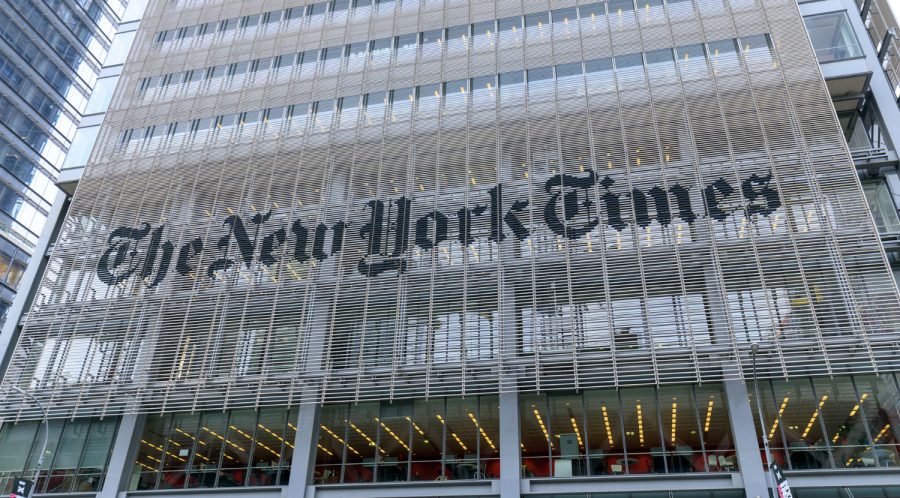Opinion: Young journalists can learn from the mistakes of the New York Times
The newspaper has made several mistakes recently, demonstrating some journalistic pratfalls to upcoming reporters.
Headquarters of The New York Times on May 7, 2018 in New York City, N.Y.
October 3, 2019
The New York Times has tripped and fallen flat a considerable amount recently. I can think of multiple instances since at least early August where the reporters and editors at the “paper of record” completely failed big time. Whether it be attempting to present President Trump’s racism as having no correlation with hate crimes against underrepresented populations or publishing a false story about Brett Kavanaugh with a tweet that implies being sexually harassed is “harmless fun,” the Times’ grasp on its responsibilities has been shaky. Readers and writers alike should see the paper’s example as how not to uphold the mission of journalism.
Most recently, the Times published an article with anonymous sources that revealed threads of the identity of the whistleblower — the individual who has brought to public knowledge President Trump’s recent phone call with Ukraine President Volodymyr Zelensky, who Trump asked to investigate former Vice President Joe Biden, the frontrunner in the race for the Democratic presidential nomination. After Special Counsel Robert Mueller said the findings of his investigation into collusion with Russia in the 2016 election did not exonerate Trump, many Democrats felt the findings could be grounds to begin impeachment proceedings, but House Speaker Nancy Pelosi shied away from an impeachment inquiry. The evidence of Trump’s call with Zelensky, however, motivated Pelosi to begin formal impeachment proceedings.
This move by the Times in particular astonishes me, not only as a reader, but as a writer with a conscience. It’s a story that threatens the safety of a private individual, and it’s a narrative that is simply not necessary. The purpose of the piece was not to inform the American public or to provide credibility of who the whistleblower is. Times Executive Editor Dean Baquet has defended all of the newspaper’s decisions, but I still find these actions to be motivated by public power and sensationalism.
The Times is the only publication I pay to read, and I have been a daily reader of it for more than three years. Considering the publication as a whole, I do admire a handful of its writers. Oftentimes its lenses align with how I personally see our national political climate, and its journalists’ voices parallel my personal thought well. Times journalists also highlight social issues such as LGBTQ rights, the environment, and race relations: your staple bag of left-wing conversation. As a writer myself, I look to the Times as a professional source of reference and responsibility.
The condition of rhetoric in the American media today, especially by that of the Times, affects the political ecosystem. It matters what journalists choose to write and how they write it, particularly under the current administration, which challenges language and fact to a degree of surrealism. In bringing corruption to the limelight, journalism must always maintain a sense of conscience and convince its readers of a moral compass.
The Times has not gone without criticism by its readership, as well as by other major newspapers for these mistakes. Young writers and journalists alike should take note of this.
The responsibility of the press is to report the truth and to inform the public. While the Times has a remarkable history of doing this throughout its history, the American public needs this newspaper’s trust and integrity today. Yes, mistakes and flawed writing will be inevitable, but all writers should strive to rectify these wrongs. The intentions of a journalist should not be necessarily for personal gain or social power, but for the common good of the public.
Columns reflect the opinions of the authors and are not necessarily those of the Editorial Board, The Daily Iowan, or other organizations in which the author may be involved.





